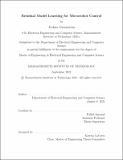| dc.contributor.advisor | Agrawal, Pulkit | |
| dc.contributor.author | Gruenstein, Joshua | |
| dc.date.accessioned | 2022-02-07T15:09:33Z | |
| dc.date.available | 2022-02-07T15:09:33Z | |
| dc.date.issued | 2021-09 | |
| dc.date.submitted | 2021-11-03T19:25:33.441Z | |
| dc.identifier.uri | https://hdl.handle.net/1721.1/139867 | |
| dc.description.abstract | A majority of microrobots are constructed using compliant materials that are difficult to model analytically, limiting the utility of traditional model-based controllers. Challenges in data collection on microrobots and large errors between simulated models and real robots make current model-based learning and sim-to-real transfer methods difficult to apply. We propose a novel framework residual model learning (RML) that leverages approximate models to substantially reduce the sample complexity associated with learning an accurate robot model. We show that using RML, we can learn a model of the Harvard Ambulatory MicroRobot (HAMR) using just 12 seconds of passively collected interaction data. The learned model is accurate enough to be leveraged as “proxy-simulator” for learning walking and turning behaviors using model-free reinforcement learning algorithms. RML provides a general framework for learning from extremely small amounts of interaction data, and our experiments with HAMR clearly demonstrate that RML substantially outperforms existing techniques. | |
| dc.publisher | Massachusetts Institute of Technology | |
| dc.rights | In Copyright - Educational Use Permitted | |
| dc.rights | Copyright MIT | |
| dc.rights.uri | http://rightsstatements.org/page/InC-EDU/1.0/ | |
| dc.title | Residual Model Learning for Microrobot Control | |
| dc.type | Thesis | |
| dc.description.degree | M.Eng. | |
| dc.contributor.department | Massachusetts Institute of Technology. Department of Electrical Engineering and Computer Science | |
| mit.thesis.degree | Master | |
| thesis.degree.name | Master of Engineering in Electrical Engineering and Computer Science | |
